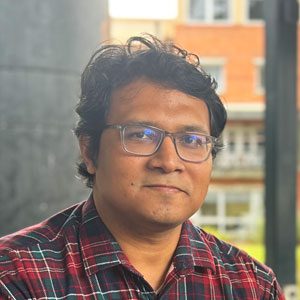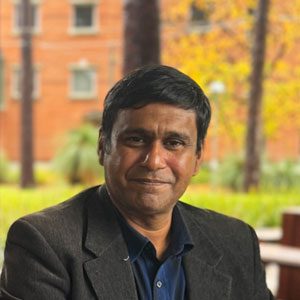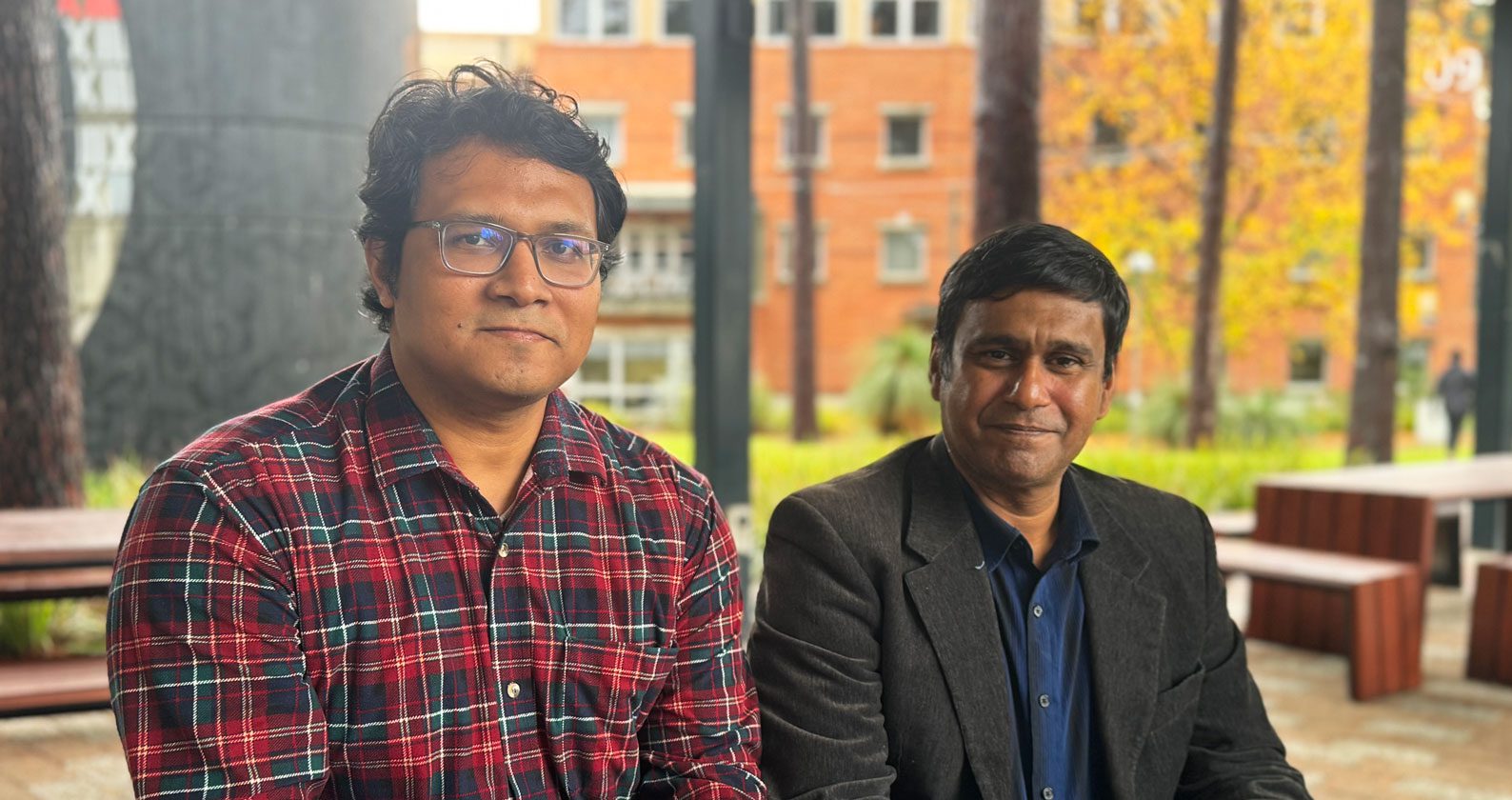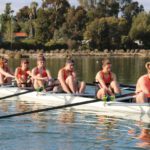Reading time: 6 minutes
Raquib saw potential in what most people throw away. Now, he’s turning recycled PLA into 3D-printed gears, tackling sustainability, engineering challenges and real-world impact under the guidance of his pioneering supervisors.
Mohammad Raquibul Hasan (Raquib) is completing a PhD in the School of Civil and Mechanical Engineering at Curtin, co-supervised by Curtin’s Professor Wahidul Biswas, Professor Michele John, Associate Professor Ian Davies and Dr. Alokesh Pramanik . Raquib and Wahidul reflect on the challenges of the 3D printing process, achievements of a publication-based research pathway and the student-supervisor relationship.
Raquib:
I completed my bachelor and master degrees in mechanical engineering in Bangladesh, focusing on sustainable engineering and the circular economy. I also gained experience working in the automotive industry and later as a university lecturer in my home country.
When I saw this project advertised on the Curtin website, I was immediately interested because it combined 3D printing with sustainability. 3D printing is an exciting and rapidly growing technology. It allows you to produce almost any part on demand, without relying on large-scale manufacturing. Although I already had some knowledge of sustainability, I wanted to deepen my expertise. I researched the supervisory team for this project and discovered that they are pioneers in the field, which strongly influenced my decision to take on this research.
My PhD research focuses on how to make recycled household PLA (polylactic acid) usable for 3D printing, with the goal of producing functional products. Recycled PLA usually has weaker mechanical properties compared to new (virgin) PLA, so I tested blends of recycled and virgin PLA to see if mixing the two could improve strength and durability.
To do this, I prepared recycled PLA by drying and extruding it into filament for 3D printing. This process came with challenges; collecting and recycling household waste, different drying methods, extrusion trials and printer settings all affected the quality of the filament. Through repeated lab work, I found that blending recycled PLA with virgin PLA improved its mechanical performance. I then printed gears with the blended filament and tested them for functionality, showing that they could be viable alternatives to virgin plastic products in industrial applications.
Alongside the technical testing, I also carried out a life cycle assessment. I compared virgin PLA, recycled PLA, and blended PLA to evaluate their environmental, economic and social impacts. Since PLA is bio-based (often made from corn), recycling it through 3D printing has the potential to reduce landfill waste, lower costs and contribute to a more sustainable circular economy. I hope that my research has value both for industry partners looking for sustainable alternatives and for other researchers interested in recycled materials.
The research faced some challenges beyond the lab. For the life cycle study, it was difficult to find people with enough knowledge of 3D printing and recycling to respond to surveys. With guidance from my supervisor, I identified suitable respondents and filled gaps in the data, which made the assessment possible.
Although I faced several challenges, I was able to overcome them with the support of my supervisors. We met regularly, usually every two weeks, and these meetings gave me valuable guidance on both the technical aspects of my work and on how to handle difficulties. Since 3D printing is a relatively new field, their advice was essential in helping me learn how to approach problems and move forward.
An exciting achievement of the research so far has been writing and publishing papers. I have published four papers so far, with the fifth and sixth currently under review. I drafted the fifth paper at the end of last year, and throughout this process I had to learn how to structure and write papers that were not only well-researched but also meaningful and impactful for the wider research community.
As an international student, I come from a very different background and environment. When I first arrived, I was immediately struck by the vibrancy of the campus, the welcoming community, and the excellent research facilities. These, along with the support of my supervisory team, played a big role in helping me gain knowledge and confidence that will shape my career.
Over the course of the PhD, my supervisor’s support meant a great deal.
He made sure I had housing sorted before I arrived, and he regularly checked in to see how I was coping with loneliness, cultural differences and language barriers. Overall, my experience under his guidance has been very positive, and I deeply value the lessons I’ve learned from him. I’ve always felt comfortable approaching him; his door was always open for questions, and he has guided me step-by-step through my research. This taught me not only how to conduct research but also how to build strong relationships with students and create an environment where they feel supported.
Wahidul:
Raquib’s research is important because it tackles the problem of petroleum-based plastics and their environmental impact. Instead of sending used PLA cups to landfill—where they would break down and release methane—he repurposed the material into something useful. For example, a single-use cup was upcycled into a mechanical gear, turning waste into a value-added product while delaying emissions.
We received 13 applications for this research position, and Raquib stood out. He already had over 13 publications, was a university lecturer in Bangladesh, and had managed research projects funded by the University Grants Commission. His background made him an excellent candidate, and he was selected as one of the scholarship recipients.
I would describe myself as a bit pushy. Mainly in pushing my students to meet their deadlines. I prefer to supervise PhD students through a publication-based pathway. Students like Raquib aim to publish four to six papers during their candidature, each addressing different objectives of their research. This not only builds their careers but also strengthens Curtin’s research profile. Raquib has already published four papers and submitted a fifth, with more under review, all within three years.
His project has not been easy. Processing post-consumer PLA cups was labour-intensive, as he had to manually cut them into small pieces before extrusion into filament. He also had to optimize 3D printing parameters such as temperature and flow rate to ensure the recycled blends performed well mechanically. In addition, the life cycle assessment side of his work required extensive data collection from industry, which was challenging because companies are often reluctant to share environmental performance data. Navigating ethics approvals and survey responses added further complexity.
Despite these hurdles, Raquib learned quickly. Coming from a mechanical engineering background, he adapted to new tools and methods in sustainability, LCA, SolidWorks design and 3D printing. His gears, made from 50/50 virgin and recycled PLA blends, proved to be mechanically viable, demonstrating real potential for industrial application.
His work makes a unique contribution to knowledge in 3D printing, PLA recycling, and waste management. It shows how waste materials can be transformed into sustainable products that are both practical and environmentally beneficial.
On a personal level, Rakib has been an outstanding student. He’s polite, hardworking and deeply committed. Even when I pushed him to meet deadlines, he responded positively and stayed motivated. Through supervising him, I also learned a great deal about 3D printing and its mechanical performance, which shows how valuable the supervisor–student partnership can be.

Mohammad Raquibul Hasan
Mohammad Raquibul Hasan is a PhD researcher at Curtin University, focusing on sustainable materials for additive manufacturing. His research examines the feasibility of using household polylactic acid (recycled PLA) waste in 3D printing, assessing their printability, mechanical properties and environmental impact. With a background in mechanical engineering, he has published multiple journal articles and has experience in academia and industry. His work supports circular economy principles by promoting material reuse and waste reduction in 3D printing, contributing to more sustainable manufacturing practices.

Professor Wahidul Biswas
Wahidul holds a PhD in Sustainable Futures (UTS) and a Masters in Environmental Technology (Imperial College London). He is currently a Professor in the School of Civil and Mechanical Engineering at Curtin University. His research spans sustainable development, life cycle assessment, and greenhouse gas mitigation across multiple sectors. He has extensive teaching experience and has held academic and research appointments in Australia, Asia, and Bangladesh.
Co-supervisors
Professor Michele John
Associate Professor Ian Davies
Dr. Alokesh Pramanik



